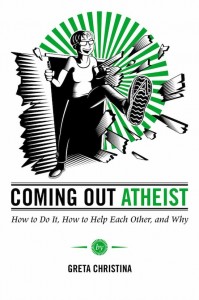Book Review: Greta Christina’s Coming Out Atheist

In Coming Out Atheist: How to Do It, How to Help Each Other, and Why Greta Christina provides a highly readable, helpful guide to the issues atheists face on whether and how to come out as an atheist. While seemingly narrow in scope, the book’s audience is actually wider than you might think. As Christina points out, coming out is a process that never ends for atheists, as even those who already consider themselves out are constantly entering new situations where the suggestions and examples in this book can be applied.
The book is basically segmented into three broad areas. The first question addressed is “Why Come Out as an Atheist?” Christina argues for doing so, not just for personal clarity and peace of mind, but for the general good of increasing the visibility of atheists in society, which helps make atheism more accepted. But she qualifies this with consideration of special circumstances, such as financial considerations, family considerations, and timing.
The bulk of the book then addresses the question of how to come out. Here, her chapter on “The Basics” outlines eighteen general considerations that have to be given thought by everyone who is an atheist. Then, in in chapter after chapter, Christina explores and expands those basics while coming out in a variety of specific settings to a variety of people, from spouses, to family, to friends, to co-workers, and to the community at large. She discusses considerations as to the best order to address them, timing, and so on. There are also chapters for coming out in the military, in high school, as a clergy person, in highly conservative communities, and in highly religious families. While some might be tempted to read only those chapters that would apply directly to them, all have points that are applicable and valuable to a myriad of situations.
While there are many variations of coming out, the two general categories are “The Big Announcement” and the slower “No Big Deal I Mention It When It Comes Up” method. Christina does a good job of exploring how each works in the various situations above. In either situation she stresses one point: As much as you may try to control the timing to different groups, or even keep it hidden from particular groups, once you start coming out, be prepared for anyone in your life to find out.
The third and final part of the book addresses the need to build communities of atheists to support each other in coming out and living an openly atheistic life. The more people that do so, the easier it is for others to, both because of the ease of finding support, and the more general acceptance in society that sheer numbers bring. A resource guide at the end is very helpful, with references and websites that even longtime atheists may not know of.
Christina is an excellent writer and journalist. Her style is breezy and easy to read, and she follows up general points with specific, real-life coming out stories and experiences that are illustrative of the larger point. She has a good way of telling stories of people who have come out and how they dealt with specific situations.
Another point she emphasizes that far too few atheists pay attention to is that the simple affirmation, “I am an Atheist,” can seem to be (and actually is) a direct attack on people’s own beliefs. It’s not a case of “I like oranges and you like apples” but rather “you like apples, I don’t think they exist.” It’s more than a simple difference of opinion, and one has to be cognizant of that when coming out.
Another point Christina makes over and over is that coming out usually (and she does emphasize usually, not always) goes much more smoothly and with much less trauma than people think it will. But no matter how the coming out goes, she can cite, in all but one case, that every atheist she interviewed is glad they did it. The only regrets some have is the way that it came out, and that is where Christina’s book can provide a useful blueprint and life guide for any atheist.
